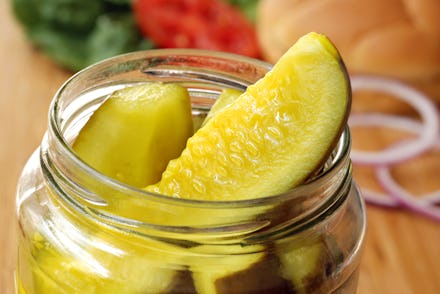Can pickle juice help alleviate cramping muscles? Here's what science says about brine

Do you chase your whiskey shots with pickle juice? How about chasing your workouts with it, too?
The briny, green liquid inside pickle jars is filled with salt and vinegar that some say make it a superior post-exercise beverage.
An infamous pro football game back in 2000 kickstarted the trend. The Philadelphia Eagles beat the Dallas Cowboys 41-14 in 109-degree heat, crediting their success to pickle juice that prevents cramps, The St. Petersburg Times reported. Later articles referred to the game as the "Pickle Juice Massacre," and now there are pickle juice products on the market, advertised specifically for performance.
Case in point: Pickle Juice Sport, which was recently profiled by Forbes.
What's more, pickle juice isn't the only unconventional liquid athletes are sipping on these days. Beet juice and cherry juice are rising in popularity, too. Cans and bottles of "natural" sports drinks line the shelves in many sporting-goods stores.
But do these beverages really do more than Gatorade or, you know, plain tap water? Here's what science has to say about these fancy hydrators:
Pickle juice
The claim: It can help cure muscle cramps.
Some athletes swear by this method — an LA Dodgers pitcher recently drank pickle juice and ate a jalapeño to quash cramps, MLB.com reported. Plenty of amateur exercisers rely on brine when they're in a pinch, too.
The reality: Evidence is sketchy at best. A very small study from Brigham Young University found that pickle brine helped 10 healthy young men's cramps dissipate within 85 seconds, the New York Times reported. This was 45% faster than drinking no liquid and 37% faster than drinking plain water.
Researchers suspected the pickle juice helped because the acidic juice triggers a signal in the brain that tells muscles to relax, noted the Times.
Beet juice
The claim: It can improve athletic performance.
New products like Beet Performer and Beet-It Sport are banking on athletes shelling out cash to get an edge. It's working: Many pro and amateur athletes are drinking the pink-colored proverbial Kool-Aid.
The reality: Beet juice is likely more helpful for sprint workouts than longer endurance events. Beets contain nitrates that can enhance blood flow, according to the Huffington Post. A 2010 study on 10 male rowers found that beet juice improved performance, and a 2011 study on cyclists found that beet juice made the athletes roughly 3% faster.
However, another study found that beet juice did nothing to help cyclists during a longer race, the New York Times reported. One of the study's lead authors hypothesized that athletes benefit from drinking beet juice regularly rather than sipping it the day of an event.
Cherry juice
The claim: Cherries and cherry juice can help muscles recover after a taxing workout. Ironman promoted cherries on its blog, and plenty of amateur athletes believe the red berry can speed up their recovery.
The reality: Several studies found that tart cherry juice reduced muscle pain after intense strength training and after a marathon, the New York Times reported. Researches don't know which compounds in cherry juice make it so potent, but they suspect anti-inflammatory and antioxidant properties may be crucial.
The bottom line on all of these juices:
If you're an elite athlete with money to burn, it can't hurt to try out these products. As long as you have approval from a medical professional (and you love the taste of pickle juice, beet juice or cherry juice), the beverages could help you avoid cramps, perform better or recover faster.